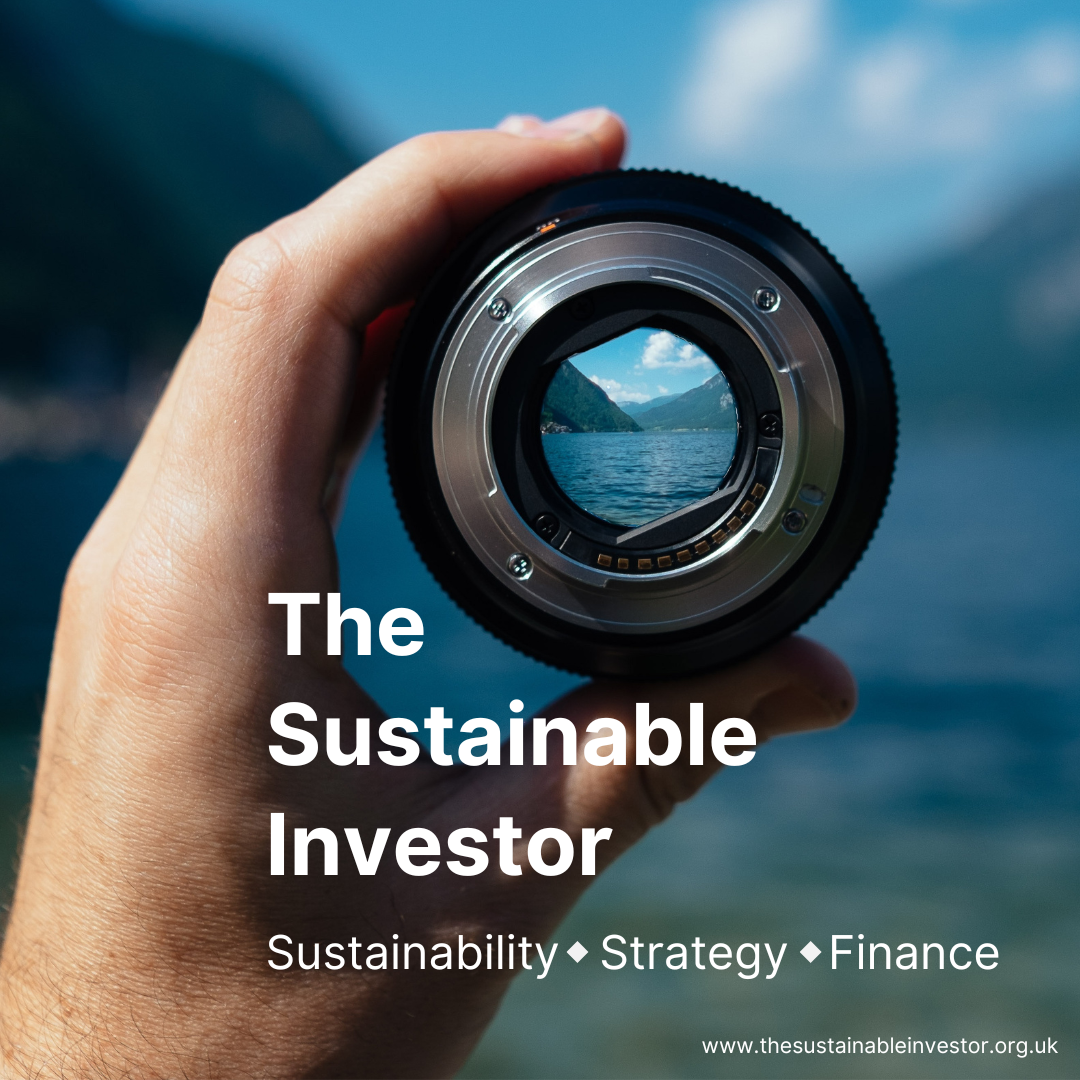
Sunday Brunch: can the real sustainable investor please stand up?
The big sustainability questions we all face suggest we need to move to a different relationship between the providers of capital (the asset owners), and the organisation's that invest it on their behalf. One based on a better alignment of interest.
"Consequently, every conversation with (investment) industry executives eventually comes round to the question of how to make themselves more appealing to potential clients" - Brodie & Harnack - The Trust Mandate
The big sustainability questions we all face suggest we need to move to a different relationship between the providers of capital (the asset owners), and the organisation's that invest it on their behalf. One based on a better alignment of interest.
I argue that, to make this happen, we need better informed asset owners (the real providers of capital).
What do they need to be better informed about? It's broadly two things, one obvious and the second less so.
The obvious one is how the sustainability transitions will work in practice. Not just the opportunities, but also the tradeoffs and compromises we need to make. No change will be cost or pain free. Complicating this further is the fact that the changes required in how our agriculture/natural capital, transport, energy, and built environment systems work are interconnected. This is all a complex system. Changing one part on it's own is often not enough.
The less obvious issue is around what drives companies to make different investment decisions? There are broadly five main drivers - threats to their licence to operate, anticipated regulatory changes, technology, new customer demands, and using soft assets (intangibles) to create different types of competitive advantage.
The more informed that asset owners are regarding these drivers, the better placed they are to make decisions about where to invest and how to engage. This is not just about values and ethics. As Schoenmaker and Schramade illustrate in their (free) book, Corporate Finance for Long Term Value, Sustainability can be a material creator of long term financial value as well.
For today's blog I want to start to explore this - starting with how companies make investment decisions, and how asset owners can use this information to make better investment choices. And how asset managers can help in this process, which in turn makes them, in the words of Brodie & Harnack "more appealing to potential clients".
If you want to read the rest and are not already a member...

Can the real sustainable investor please stand up
The people who really care about sustainability, because they are the ones most impacted by it, are what our industry calls asset owners (pension funds, insurance companies, family offices, endowments, high net worth individuals, and retail investors). These are the people who provide the money (capital) that makes the investment process work. And by and large the people they represent are the ones who will suffer if the sustainability transitions fail.
Hence they are the ones best placed to decide the trade offs. Basically answering the question - how important is pure short term financial return to me, and how prepared am I to make tradeoffs for future financial and non financial benefits?
At the other end of the investment process from the asset owners are the companies. It's their investment choices that will deliver the sustainability transitions we want. These investment choices should reflect the preferences of their providers of capital.
But, one barrier to encouraging change is the disconnect between the companies and the asset owners. Asset owners and companies rarely get to speak to each other. Between the two of them are a variety of intermediaries, including asset managers and consultants.
Given that it's the asset owner's money that is being invested, isn't it right that they have a bigger say in how it happens? Well yes, but that is where it gets complicated.
The traditional view was that investing is purely a financial exercise. Asset owners set the risk and reward criteria, and asset managers invest on their behalf, focusing on maximising financial return. Under this structure asset owners didn't need to speak with companies.
But that is now changing, and we argue that the change is going to accelerate. Asset owners are increasingly concerned about sustainability issues.
It's not really practical for asset owners to speak with every company they are invested in, to check that their interests are aligned. They still need asset managers to do that on their behalf. But, they need to give them very different guidance from before. And this guidance needs to be informed.
For this to work, asset owners need (among other issues) to understand how companies make investment decisions.
I will come back to this in more detail in future blogs, but my experience has been that there are five main levers.
- Threats to their licence to operate - if this is lost the company has no viable future. Most examples that get quoted are about industries such as mining, where an absence of the 'licence to operate' can result in the development of new mines being blocked or existing mines being closed. But it can also include social issues - has the company previously known as Twitter so badly damaged it's own 'licence to operate' (especially with advertisers) that it's future is at risk ?
- Anticipated regulatory changes - this is probably the most obvious sustainability driver of change, and the one that gets a lot of attention. A good example is carbon pricing but changing regulations focused on pollution, worker rights, and product safety are also important. Companies often have time to respond to new regulation, but anticipating change is normally better than waiting for it to happen.
- Technology - again, a fairly obvious driver. Good examples include renewable electricity generation (solar and wind) and electric vehicles. It's a big topic in it's own right, but it's probably not as important as you might first think. Technology on it's own is seldom the primary source of company competitive advantage.
- New customer demands - from a sustainability perspective this has happened first in food (non diary milk etc) but over time we expect it to spread to other sectors including fashion, consumer products such as cars, and choices around commercial buildings. This could be a big driver in the future.
- Using soft assets (intangibles) to create different types of competitive advantage - this is probably more important than you first think. For most companies 'process' is a massive differentiator. Think here about supply chains, industrial processes, how innovation happens (including the role of true diversity), customer service levels, staff retention, and brand value.
Put simply, if asset owners better understand how companies decide strategy and make investment choices, they can better identify how to get companies to change. Which not only impacts their investment choices, it also should drive how they engage with companies - helping them to make choices that are aligned with the values of their providers of capital, and that create long term financial value.
And we argue that asset managers have a key role to play in this education process.
But, for this to work, they have to think differently about why they provide this education. It's not just about sales and marketing, about directly targeting a growth in Assets Under Management (AUM).
This can also be an excellent way to build trust. Thinking about this as a partnership could be the future competitive advantage that enables asset managers to "make themselves more appealing to clients". Which in turn, could end up enabling them to maintain their own profitability. It's what Alex Edmunds calls Growing the Pie, not fighting over how the pie is divided.
Something a little more bespoke?
Get in touch if there is a particular topic you would like us to write on. Just for you.
Contact us
Please read: important legal stuff.

